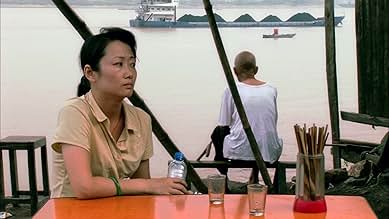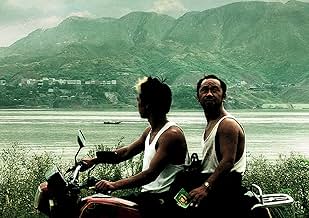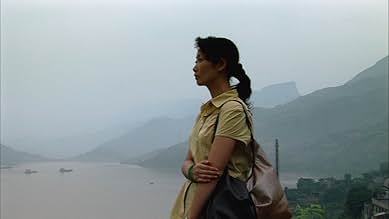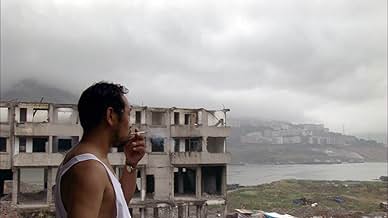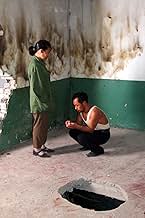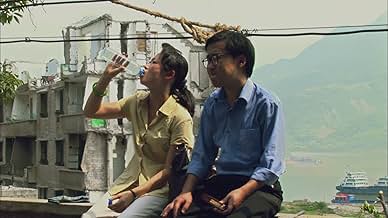IMDb-BEWERTUNG
7,3/10
7747
IHRE BEWERTUNG
Füge eine Handlung in deiner Sprache hinzuA town in Fengjie county is gradually being demolished and flooded to make way for the Three Gorges Dam. A man and woman visit the town to locate their estranged spouses, and become witness ... Alles lesenA town in Fengjie county is gradually being demolished and flooded to make way for the Three Gorges Dam. A man and woman visit the town to locate their estranged spouses, and become witness to the societal changes.A town in Fengjie county is gradually being demolished and flooded to make way for the Three Gorges Dam. A man and woman visit the town to locate their estranged spouses, and become witness to the societal changes.
- Auszeichnungen
- 15 Gewinne & 14 Nominierungen insgesamt
Empfohlene Bewertungen
Still Life touches upon all the problems surrounding the controversial issue of the construction of the Three Gorges Dam but it only presents short glimpses of this reality, like colorful splashes of paint onto a palette: we see the young sixteen year old begging the outsider to take her away and find a job for her as a maid in a big city, panels indicating the phases of demolition, the word "demolition" painted outside people's residences, workers pulling down constructions, land compensation, relocation and myriads of hints at the inside stories of the people: helplessness, cynicism, acceptance, nostalgia.
The plot is very simple: a coal miner coming to the Three Gorges in search of his wife, whom he hasn't seen in sixteen years and a woman in search of her husband, whom she hasn't seen in three years. The human stories, set against the background of the Three Gorges and the Yangtze River, are fleeting, fragile, ethereal. The characters' journey is both physical and psychological. They both have traveled from Shanxi province in search of their wife and husband but their journey is also a journey into consciousness, nostalgia, loss and the past. Besides, it is also a crucial step before a new future. Along with the nostalgia and the lingering on what is lost, there is also a constant need to make decisions and move on, which is what the characters do. We, spectators, follow the characters at the same time as we/they make a journey into the Three Gorges. The connection between the characters and the landscape is obvious. The journey is not only into the characters' past but also a hint at the past of the Three Gorges, at all the villages which have been pulled down and at those who are about to disappear. The sense of loss in the characters' lives is unmistakably connected to the Three Gorges, to that which is already lost and to what is about to be taken away.
The film is definitely a beautiful and poetic reflection on time. The coal miner, Han Sanming, keeps the address of his former wife written on an old pack of cigarettes. When a young boy asks him what they are, he replies that they used to be the best brand of cigarettes sixteen years ago. The boy says he is too nostalgic, and to this, Han Sanming answers gravely that "we all remember our pasts". Yet Still Life is not only about time lost. There are also celebrations of the present. Han Sanming's determination to try again with his ex-wife is a note of optimism and hope. Various scenes in the film also show villagers dancing, enjoying a singing performance, where the camera lingers on their expressions of joy and enthusiasm, a clear celebration of life.
All the films I've seen about the Three Gorges and the Dam share a strong emphasis on the visual, arguably because the gripping power of the landscape cannot make it otherwise. Still Life is not an exception. One of its signs of distinction, which greatly accounts for the beauty of the film, is the way in which it is shot. The motion of the camera is always very slow and contemplative. It moves along the river banks as well as along objects and characters' faces in a fashion similar to that of a ship moving along the river. This slow, balanced, contemplative motion also recalls the movement of water, and brings to the viewer notions of fluidity, transformation and renewal. The background of the Three Gorges and the Yangzte is always there. Many takes show the contrast of the characters' insignificance against the overwhelming vastness of the landscape, and this is also done with objects. As Han Sanming contemplates a 10 Yuan note, the close take of the note is again set against the background of the Gorges. To all this must be added the attention to detail: the humanity of people's conversations, the taste of local Sichuan people, the colors, the contrasts. To me, Still Life is not only a cinematographic accomplishment. It is also evidence that people still remember, at this very important moment in time, the Three Gorges and its people.
The plot is very simple: a coal miner coming to the Three Gorges in search of his wife, whom he hasn't seen in sixteen years and a woman in search of her husband, whom she hasn't seen in three years. The human stories, set against the background of the Three Gorges and the Yangtze River, are fleeting, fragile, ethereal. The characters' journey is both physical and psychological. They both have traveled from Shanxi province in search of their wife and husband but their journey is also a journey into consciousness, nostalgia, loss and the past. Besides, it is also a crucial step before a new future. Along with the nostalgia and the lingering on what is lost, there is also a constant need to make decisions and move on, which is what the characters do. We, spectators, follow the characters at the same time as we/they make a journey into the Three Gorges. The connection between the characters and the landscape is obvious. The journey is not only into the characters' past but also a hint at the past of the Three Gorges, at all the villages which have been pulled down and at those who are about to disappear. The sense of loss in the characters' lives is unmistakably connected to the Three Gorges, to that which is already lost and to what is about to be taken away.
The film is definitely a beautiful and poetic reflection on time. The coal miner, Han Sanming, keeps the address of his former wife written on an old pack of cigarettes. When a young boy asks him what they are, he replies that they used to be the best brand of cigarettes sixteen years ago. The boy says he is too nostalgic, and to this, Han Sanming answers gravely that "we all remember our pasts". Yet Still Life is not only about time lost. There are also celebrations of the present. Han Sanming's determination to try again with his ex-wife is a note of optimism and hope. Various scenes in the film also show villagers dancing, enjoying a singing performance, where the camera lingers on their expressions of joy and enthusiasm, a clear celebration of life.
All the films I've seen about the Three Gorges and the Dam share a strong emphasis on the visual, arguably because the gripping power of the landscape cannot make it otherwise. Still Life is not an exception. One of its signs of distinction, which greatly accounts for the beauty of the film, is the way in which it is shot. The motion of the camera is always very slow and contemplative. It moves along the river banks as well as along objects and characters' faces in a fashion similar to that of a ship moving along the river. This slow, balanced, contemplative motion also recalls the movement of water, and brings to the viewer notions of fluidity, transformation and renewal. The background of the Three Gorges and the Yangzte is always there. Many takes show the contrast of the characters' insignificance against the overwhelming vastness of the landscape, and this is also done with objects. As Han Sanming contemplates a 10 Yuan note, the close take of the note is again set against the background of the Gorges. To all this must be added the attention to detail: the humanity of people's conversations, the taste of local Sichuan people, the colors, the contrasts. To me, Still Life is not only a cinematographic accomplishment. It is also evidence that people still remember, at this very important moment in time, the Three Gorges and its people.
Reviewed at the North American premiere screening Tues. Sept. 12, 2006 at the Varsity 8 Theatre during the Toronto International Film Festival (TIFF).
I was lucky enough to be at TIFF screenings on Monday when it was announced that Sanxia Haoren was going to have a special one-time screening as a last minute addition to the Visions programme of TIFF 2006. I think the online tickets went fairly quickly and the theatre was packed with a considerable overflow of film writers & critics who had been unable to squeeze into the industry screening.
Sanxia Haoren has been given the title Still Life for international release, but the original Chinese title would seem to translate simply as Three Gorges Good People and it is in the vicinity of the dam's construction and the city demolitions and the people displacement entailed by it, that the film takes place. The film has a bookend plot of a miner Han Sanming (character's and actor's names are identical) who comes to the town of Fengjie to search for his estranged wife and child. The centrepiece story is that of a nurse named Shen Hong who is searching for her missing husband.
The dour faced Han Sanming is initially a cause of concern as it seems at the very start he is going to be swindled by tricksters on the river ferry but he soon shows that he can hold his own. We then think he is going to conned by a sarcastic motorcycle taxi driver who takes him to the location of his supposed house only for him to find it is now submerged under water. Things soon settle down for Han though as he finds lodging in a boarding house and work as a house demolition man on a crew with a brash young man who seems to have learned all his life lessons from the movies of Chow Yun Fat. Various humorous interludes (such as a young boy who sneaks cigarettes and roams around singing overly romantic songs which usually degenerate into an off-key screech by their end) and certain magic sequences (which I won't spoil) serve to bring comedy and wonder along the way. Several times the screen is seemingly chapter titled with the words "cigarette", "liquor", "tea" and "toffee", when these items occur during the plot, and any other meaning to this device eluded me. The journey of Shen Hong is similarly full of encounters with different characters on the way. I don't think the two stories actually intersected, but I may have been somewhat tired at this mid-way mark of TIFF as this screening went from 10:30 pm to 12:30 am.
The impression that the actors were perhaps simply playing versions of themselves was reinforced later in the week when I also caught the same director's documentary "Dong" which follows painter Liu Xiao-dong around locations at the Three Gorges Dam and it turned out that Han Sanming was actually one of the sturdy workmen that painter Liu was using for his models in a large multi-paneled painting of men. A blond-dye haired motorcycle taxi driver of Still Life makes a cameo appearance in Dong as well.
I found both of these films equally absorbing as they told stories of regular people in somewhat extreme life-changing situations and also that the 2 films complemented each other in a symbiotic way. Seeing one will enhance your appreciation of the other and vice versa. Both films are very deliberately paced but very lyrical and if you have an appreciation for slower paced film they are very rewarding. Also, if you did not have any concept of the magnitude of what is going on in the Three Gorges area, these films will give you a first hand view.
The director Jia Zhang-ke was not in attendance for the North American premiere, as he presumably was still in Venice celebrating his win of the Golden Lion for this film and 2 awards for the documentary.
I was lucky enough to be at TIFF screenings on Monday when it was announced that Sanxia Haoren was going to have a special one-time screening as a last minute addition to the Visions programme of TIFF 2006. I think the online tickets went fairly quickly and the theatre was packed with a considerable overflow of film writers & critics who had been unable to squeeze into the industry screening.
Sanxia Haoren has been given the title Still Life for international release, but the original Chinese title would seem to translate simply as Three Gorges Good People and it is in the vicinity of the dam's construction and the city demolitions and the people displacement entailed by it, that the film takes place. The film has a bookend plot of a miner Han Sanming (character's and actor's names are identical) who comes to the town of Fengjie to search for his estranged wife and child. The centrepiece story is that of a nurse named Shen Hong who is searching for her missing husband.
The dour faced Han Sanming is initially a cause of concern as it seems at the very start he is going to be swindled by tricksters on the river ferry but he soon shows that he can hold his own. We then think he is going to conned by a sarcastic motorcycle taxi driver who takes him to the location of his supposed house only for him to find it is now submerged under water. Things soon settle down for Han though as he finds lodging in a boarding house and work as a house demolition man on a crew with a brash young man who seems to have learned all his life lessons from the movies of Chow Yun Fat. Various humorous interludes (such as a young boy who sneaks cigarettes and roams around singing overly romantic songs which usually degenerate into an off-key screech by their end) and certain magic sequences (which I won't spoil) serve to bring comedy and wonder along the way. Several times the screen is seemingly chapter titled with the words "cigarette", "liquor", "tea" and "toffee", when these items occur during the plot, and any other meaning to this device eluded me. The journey of Shen Hong is similarly full of encounters with different characters on the way. I don't think the two stories actually intersected, but I may have been somewhat tired at this mid-way mark of TIFF as this screening went from 10:30 pm to 12:30 am.
The impression that the actors were perhaps simply playing versions of themselves was reinforced later in the week when I also caught the same director's documentary "Dong" which follows painter Liu Xiao-dong around locations at the Three Gorges Dam and it turned out that Han Sanming was actually one of the sturdy workmen that painter Liu was using for his models in a large multi-paneled painting of men. A blond-dye haired motorcycle taxi driver of Still Life makes a cameo appearance in Dong as well.
I found both of these films equally absorbing as they told stories of regular people in somewhat extreme life-changing situations and also that the 2 films complemented each other in a symbiotic way. Seeing one will enhance your appreciation of the other and vice versa. Both films are very deliberately paced but very lyrical and if you have an appreciation for slower paced film they are very rewarding. Also, if you did not have any concept of the magnitude of what is going on in the Three Gorges area, these films will give you a first hand view.
The director Jia Zhang-ke was not in attendance for the North American premiere, as he presumably was still in Venice celebrating his win of the Golden Lion for this film and 2 awards for the documentary.
I've seen lots of presentations by businesspeople and academics about Chinese industry, development, social problems, politics, progress, environmental disasters, etc. etc. I've never seen anything like this. It's China on the ground - actually a town about to be submerged by the Three Gorgest Dam project. The title translation of "Three Gorges Good People" is right - these are ordinary folks who endure, persist, help each other out, etc. in a mixed landscape of natural beauty, building, poverty, and destruction that has to be seen to be understood. The story of the dam shapes everybody's life without actually determining or washing them out. Definitely try to see this if you have any interest at all in China today.
The movie tells two separate stories of two people. They are both from Shaanxi and take a long way to Fengjie to find their relatives. As they came to Fengjie, a 2000 year old city was going to submerge under water as the great Three Georges Dam was being built. Even though the media always tells great things about the Three Georges Dam, what the audience actually see is a dying town which is being demolished part by part. Along with the city is the destinies of poor people living here. People were forced to relocate and find another place to live and work. The movie is also very successful to depict the miserable living condition of poor people in the region. From here, another aspect of Chinese economic miracle is revealed as poor people find no way to get out of deadly spiral of poverty and have no choice but to move to other places such as Shaanxi to work as coal miners - a job as described in the movie can help them earn more money than their hometown but is also riskier as dozens of people die every year.
Another success of the film is the choice of music and songs that were played intermittently during the movie. In particular, the old song "Seung Hoi Tan" was used as a ringing tone for the phone of a local worker, perhaps as a reminder of old traditional value. On the other hand, "Mouse Love Rice" - a new rising love song at that time was singed passionately by the young kid marking the subtle transform in Chinese culture.
Another success of the film is the choice of music and songs that were played intermittently during the movie. In particular, the old song "Seung Hoi Tan" was used as a ringing tone for the phone of a local worker, perhaps as a reminder of old traditional value. On the other hand, "Mouse Love Rice" - a new rising love song at that time was singed passionately by the young kid marking the subtle transform in Chinese culture.
China's sixth generation director Jia Zhang-ke's recent Golden Lion winner at Venice is slightly more accessible to the general audience than his previous work, although Shijie (2004) has been heading generally towards that direction. Unlike Xiao Wu (1997), which is completely devoid of story or plot, Still Life at least has a story (in fact two) of sorts but, to Jia credit, stays away from the conventional Hollywood melodrama formula. The last thing we need is another Hollywood-look-alike movie made by a Chinese director who gives up what he is good at to impersonate a Hollywood director. There are already too many.
The story of the Three Gorges Dam begs to be told. Jia tells it from a micro, personal angle, by weaving two separate stories together, with the Three Gorges Dam project not just as a backdrop, but also as a subject of enquiry. In polarized contrast to the gorgeous tourism posters, Jia's camera shows the devastation along the Gorges in a way that almost reminds you of the ruins in Polanski's "The pianist". In the two unrelated stories, two people arrive in the same riverside town, a nurse looking for her husband who seems to have lost interest in her, and a coalminer searching for his wife who left him, taking with her their daughter.
These stories are told in Jia's usual minimalist style, but with pain sticking attention to details. Instead of the dialogue, it's the nuances, the body language, and even the framing of the shot that reveals. New to Jia's screen are moments of playful, surprising touches as if the director is saying "Hey, I can handle surreal too". The appropriate use of pop music from Hong Kong, Taiwan and the Mainland of China adds to the dimension and depth of the film.
True to his tradition, Jia films the life of ordinary people just as it is. The coalminer in Still Life is one in real life, and a relative of Jia. He even uses his real name Han San-ming. True to his tradition again, Jia uses only one professional actor, Zhao Tao, but she is so good that you can't tell her apart from the rest of the "cast" in terms of being an authentic, ordinary person that Jia might have just picked from a crowd in the street.
I miss Jia's earlier work such a Xiao Wu, for its uniqueness and detached, realistic depiction of lives of real people. On the other hand, I don't mind his introduction of conventional "entertaining" elements, so long as he stops before, way before, succumbing to the senseless scramble of the Chinese 5th generation directors to capture the Hollywood market. Many a soul has been sold for fame and fortune.
The story of the Three Gorges Dam begs to be told. Jia tells it from a micro, personal angle, by weaving two separate stories together, with the Three Gorges Dam project not just as a backdrop, but also as a subject of enquiry. In polarized contrast to the gorgeous tourism posters, Jia's camera shows the devastation along the Gorges in a way that almost reminds you of the ruins in Polanski's "The pianist". In the two unrelated stories, two people arrive in the same riverside town, a nurse looking for her husband who seems to have lost interest in her, and a coalminer searching for his wife who left him, taking with her their daughter.
These stories are told in Jia's usual minimalist style, but with pain sticking attention to details. Instead of the dialogue, it's the nuances, the body language, and even the framing of the shot that reveals. New to Jia's screen are moments of playful, surprising touches as if the director is saying "Hey, I can handle surreal too". The appropriate use of pop music from Hong Kong, Taiwan and the Mainland of China adds to the dimension and depth of the film.
True to his tradition, Jia films the life of ordinary people just as it is. The coalminer in Still Life is one in real life, and a relative of Jia. He even uses his real name Han San-ming. True to his tradition again, Jia uses only one professional actor, Zhao Tao, but she is so good that you can't tell her apart from the rest of the "cast" in terms of being an authentic, ordinary person that Jia might have just picked from a crowd in the street.
I miss Jia's earlier work such a Xiao Wu, for its uniqueness and detached, realistic depiction of lives of real people. On the other hand, I don't mind his introduction of conventional "entertaining" elements, so long as he stops before, way before, succumbing to the senseless scramble of the Chinese 5th generation directors to capture the Hollywood market. Many a soul has been sold for fame and fortune.
Wusstest du schon
- WissenswertesRanked second in French film magazine Cahiers du cinéma's top 10 list of the best pictures of 2007, tied with Inland Empire (2006) and Death Proof - Todsicher (2007).
- VerbindungenFeatures City Wolf (1986)
Top-Auswahl
Melde dich zum Bewerten an und greife auf die Watchlist für personalisierte Empfehlungen zu.
- How long is Still Life?Powered by Alexa
Details
Box Office
- Budget
- 10.000.000 CN¥ (geschätzt)
- Bruttoertrag in den USA und Kanada
- 76.983 $
- Eröffnungswochenende in den USA und in Kanada
- 12.744 $
- 20. Jan. 2008
- Weltweiter Bruttoertrag
- 2.504.465 $
- Laufzeit
- 1 Std. 51 Min.(111 min)
- Farbe
- Sound-Mix
- Seitenverhältnis
- 1.78 : 1
Zu dieser Seite beitragen
Bearbeitung vorschlagen oder fehlenden Inhalt hinzufügen



